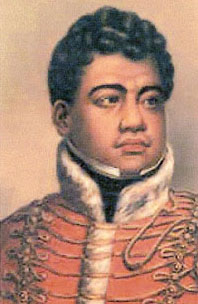- ʻO Kalena kai Haleʻauʻau
- Aʻo līhuʻe i Mālama nui
- ʻO kaʻehuʻehu o ke kai
- Ka moena pāwehe o Mokulēʻia
- ʻO ka wai iho ia olu kāua
- Aʻo Kaʻala kau mai i luna
Ka lae ʻo Kaʻena oni ma mua
ʻO Lauhulu no me Puʻukapu
ʻO Halemano lūlū i ka lehua
ʻO Waimalu no noho i ka malu
Haʻina ʻia mai ana ka puana
O ka lua o nā lani e ō mai
Haʻina ʻia mai ana ka puana
Aʻo līhuʻe i Mālama nui
- Aʻo līhuʻe i Mālama nui
- Kalena kai, the
bathhouse
- The chill at Mālama nui
- The sea spray
- Geometric designs of the plains of Mokulēʻia
- The descending water refreshes us
- Mount Kaʻala rises above
- The cape of Kaʻena appears ahead
- With Lauhulu and Puʻukapu
- Halemano is verdant with lehua
Waimalu is there in peace
- Tell the refrain
- The graves of the chiefs, they call
Tell the refrain
The chill at Mālama nui
- The chill at Mālama nui
Source: Thomas T Shirai
Jr, Kawaihapai Ohana, including cousin Kumu Hula Antone Kaoʻo of
Mokulēʻia,
Waialua - This mele, originally a chant by King Liholiho, was
set to music by Charles E King and honors
places in Waialua Moku. Liholiho wrote this in remembrance of a visit
to Waialua in the 1820's, when he & Kaʻahumanu stopped there on the
way to Kauaʻi to see King Kaumualiʻi. In ancient times, certain areas
of the sea were kapu or designated places to bathe. This ceremonial bathing
was for remission of sin. Verse 1, Haleʻauʻau is a gulch in Waialua,
Lihuʻe and Mālama nui, land divisions near Schofield. Verse 2, praises
the agricultural productivity of the fields of Mokulēʻia that resemble
a patterned mat and the Kawaihapai ohana, who treat this as their ohana
mele. The ohana provided supplies and probably entertained the royal
retinue. Verse 3, Kaʻala, the highest mountain on Oʻahu and Kalena, the
2nd highest peak, are both at Wahiawa. Verse 4, Kaʻena Point, is where
the souls of the departed (leileina ʻuhane) leap into the next world.
Lauhulu and Puʻukapu are the guardians of Mount Kaʻala. Verse 5, Halemano
was famous for its ohiʻa lehua and Waimalu, a place of purification,
was kapu. Translated by Kanani Mana. Recorded by Kuʻuipo Kumukahi, "E
Kuʻu
Lei, E Kuʻu Ipo" CD

King Liholiho